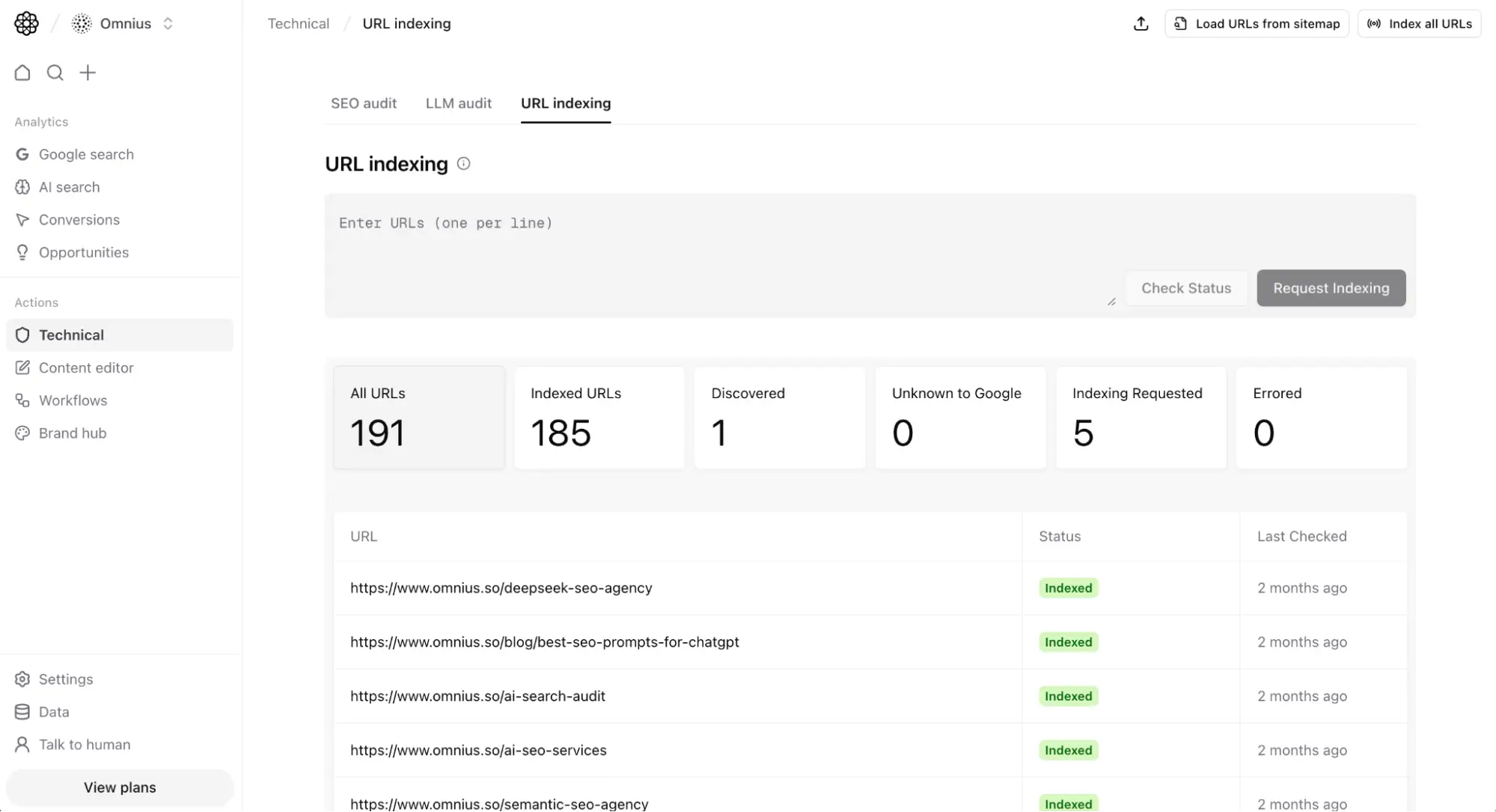






When new or updated pages are added to a site, traditional search indexing can take days or weeks depending on crawl budgets and page authority. Atomic’s Rapid URL Indexing module automates this process by combining structured data scanning, sitemap monitoring, and Google Indexing API integration to accelerate how quickly critical URLs are discovered and surfaced.
The feature continuously monitors the site’s sitemap and internal link graph. When new URLs are detected or existing pages undergo substantial changes, Atomic classifies them based on importance and freshness signals. High-priority URLs (such as product, pricing, or article pages) are queued for immediate submission through indexing APIs. This process ensures that the most relevant pages are indexed within hours rather than days.
Atomic uses a three-layer validation process before submission.
Once these checks pass, Atomic automatically sends the URLs to the indexing endpoint and logs the submission within the project dashboard. Users can view indexing status, last submission date, and re-index triggers per URL. This provides full transparency into how often each page is refreshed across engines.
The Indexing Efficiency metric aggregates performance across your site. It reflects the ratio between pages updated and pages successfully indexed within 24 hours. A high percentage indicates strong technical readiness and authority, while lower ratios highlight crawl bottlenecks or server configuration issues.
Beyond Google, the module integrates with Atomic’s AI Visibility Tracker to monitor how newly indexed pages appear in large language models such as ChatGPT or Perplexity. Because AI engines often rely on structured and recently indexed data, maintaining rapid inclusion in traditional search directly influences visibility across AI-driven answer engines.
From a workflow perspective, the system runs as part of the Technical SEO module, operating continuously and requiring no manual input after setup. Users can configure thresholds for auto-submission, define which directories or templates should be prioritized, and exclude low-value or ephemeral URLs.
Each submission event is also reflected in Atomic’s Activity Log, allowing teams to correlate indexing actions with subsequent metrics like impressions, clicks, and AI mentions. This creates a traceable link between publishing, technical action, and visibility outcome.
For larger sites, Atomic supports bulk indexing requests through its Automation Layer. This enables batch submissions for hundreds or thousands of URLs while ensuring compliance with API rate limits and structured data consistency. The system handles retries automatically when the search engine response indicates temporary failure, and flags persistent issues for manual review.
Ultimately, Rapid URL Indexing ensures that every structural or content improvement made through Atomic’s other modules-such as Content Optimization, Page Speed, or Schema Management-translates into faster search visibility. It turns publishing into a measurable, near-real-time feedback loop.

The module pulls from XML sitemaps, Atomic’s internal crawl data, and content change logs. When enabled, it can also integrate directly with your CMS or deployment pipeline to detect new pages immediately upon publication.
Currently, API-based submission is supported for Google. However, Atomic’s crawl notifications and structured data optimizations improve natural discovery across Bing, DuckDuckGo, and AI engines using public web data.
Atomic verifies submission success via response codes and monitors subsequent crawl and visibility signals. A URL is marked as “Indexed” once impressions or crawls are detected within the defined window, typically 24–48 hours.
Large language models like ChatGPT and Perplexity rely on up-to-date indexed content to form answers and citations. By ensuring faster indexing, Atomic increases the likelihood that fresh or optimized pages are included in these models’ datasets.
Yes. The interface includes a Manual Submit option for high-priority URLs. This is useful after major updates or launches where immediate inclusion is necessary.


Integrate your data sources with Atomic in as little as 4 minutes.

No coding, no complex setup, and no heavy learning curve.

Your data is visible only to you. Our system is completely encrypted.